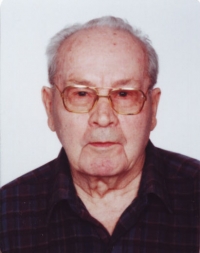Josef Cmíral
* 1915 †︎ unknown
-
"The English attacked and it took about 14 days. Marry-go-round - they call it a carousel. These are planes that spin all the time. The first planes were without an engine. Towed tugs, which were released near the coast and it landed there. At the same time, the planes bombed and blew up the circuit. This was called the Devil's Channel. The Germans dug a canal ten meters deep and 15 meters wide, and there they took a train with wagons through [and kept the supplies going] in case there was an attack. But the English immediately destroyed it and there were about a thousand dead Germans. When we looked for it, we knew it by the stench. The wind came, we sniffed and that was it. That's how we found it. But it was terrible..."
-
"We were in the Chomondeley park camp for two months and we had our rifles thrown in one pile. It was such a big pile, all the rifles and machine guns ... And suddenly the bombers, the Germans. There was much noise at night. It was terrible and the bombs were falling and just waiting to see how far away from us. And suddenly in about half an hour it started to burn. But all around. And the boxer Švancara climbed out of the tent and said, 'Guys, come and see! The Germans set the world on fire!' And it really looked like the whole world was on fire."
-
"They loaded me in a truck and we travelled along the line to Bordeaux for fourteen days or three weeks. Ten kilometres from Bordeaux, they put me aside and the situation was so stupid that no one knew what would happen. They told me that the Germans were four kilometres far from Bordeaux, so they put me in a meadow, took my papers, burned everything, and the Germans would took me. But that was stupid. That was a stupid feeling for me. But they did it. They left me lying in the meadow and went to Bordeaux."
-
"The Germans probably also got word because they put ship cannons on the tram bottoms and aimed the section. And the section was so focused that when the artillery fire starts in the morning because of the noise, so that the tanks were not heard being started, only then will the tanks come out. Overnight, the engineers made a route with white tapes, but there was a big wind, so the tapes were blown away. So the first launched tank hit a mine. It was broken, its belt was gone. The second, when the Germans heard it was firing, they fired back and shot the tower down. Seven tanks made not even 15 meters, and they had to retreat. But with that recoil and all those preparations, there were 54 dead. And no thinking with the proviso that they would take them and lay them down somewhere decently... Nonsense; they took them by their hands and feet and threw them like manure. One had his foot behind his head, the other his head half missing, and the third had both legs gone. So it lay there for about four days in a heap. Only later did a car with ordinary coffins and sheets arrive and brought them to the cemetery."
-
Full recordings
-
asi Svatý Štěpán, 17.05.2003
(audio)
duration: 45:37
Full recordings are available only for logged users.
They left me lying in the meadow and left
Josef Cmíral was born on August 30, 1915, and came from a family with seven children. After the death of his father, who perished during the First World War, his mother remarried and the large family grew even larger. Josef spent his youth in Germany, where his stepfather went to work as a teacher at the new Czechoslovak school. Josef trained as an electrician and graduated from industrial school. In the autumn of 1939, he enlisted in the Czechoslovak contingent in France in Brussels and enlisted in Lille in April 1940. He underwent telegraphic training in Montpellier and in Agde and was assigned to the telegraph operators as a motorcycle clutch. After a serious accident in which he seriously injured his leg, he was transported along the front line to the south of France. Here, due to poor health, he was left to his fate, but thanks to luck, he got on a ship bound for England. In Cholmondeley Park, his injured leg was rescued, even though it looked he would have it amputated at first. Thanks to the care of Czech doctors, he was able to return to service and in 1944 even back to the front. He participated in the ground siege of Dunkirk until the end of the world conflict. After the liberation of Czechoslovakia, he returned to his homeland and took part in battles with the Banderas group. At the end of 1945, he went into civilian life and returned to his profession. He married in 1947. In 2003 he lived in the village of Svatý Štěpán.
